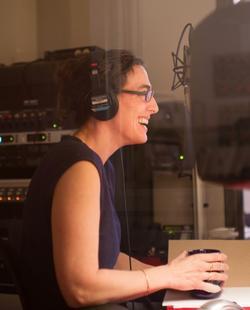Radio Hosts
Susan Stamberg and Sarah Koenig both love a good story. Stamberg, the first woman anchor of a major news program, broke new ground for women in radio and created an original on-air narrative style. Through her sensational podcast hit Serial, Koenig has innovated an entirely new format for audio storytelling. Both have changed how radio stories are told—and how we listen.
For longtime listeners of National Public Radio, Susan Stamberg’s voice is instantly recognizable—no voiceover identification needed. Deep and slightly raspy, it’s the result of “happy, happy years of smoking . . . that will roughen up your pipes,” she confesses. It’s a voice that also immediately communicates warmth and amusement—the listener can’t help but be drawn into Stamberg’s on-air pieces because she herself sounds so charmed by her subjects. What other respected journalist could turn a family recipe (she recites “Mama Stamberg’s Cranberry Relish” on air every year at Thanksgiving) into a tradition as beloved and comforting as the holiday itself?
A founding staff member of NPR when the network was established in 1971, Stamberg became the first-ever woman anchor of a prime-time news show, All Things Considered, in 1972. Her pioneering role was met with resistance from regional station managers who felt a woman didn’t have enough authority to be the voice of a major news program. But she prevailed and went on to use her position as a feminist platform, making a point of regularly covering women’s issues on All Things Considered. “I feel, as women of my generation do,” she says, “that I helped to invent feminism.” Because of her hard-won “firsts” for women in the field, she is committed to mentoring younger women colleagues as they too navigate a changing field. “I want them to keep waving the flag for us all,” she tells JWA.
After 14 years at the anchor desk, Stamberg applied her intellect and curiosity to several other NPR programs before becoming a special correspondent for Morning Edition, a position she still holds today. She describes what she does at NPR as “talking with strangers and inviting them to have conversations.” In her on-air pieces, she locates the quirky, offbeat heart of a story, and is fascinated by “lifting the curtain” and looking behind the scenes. To this day, she still follows the advice of her original All Things Considered producer, who “wanted the network to sound not like the all-knowing voice from the top of the mountain, but like somebody across the fence asking you to puzzle along with them the things that happened on a given day.” Susan Stamberg is the quintessential neighbor leaning over the fence, inviting us to ponder the world with her.
Sarah Koenig didn’t start out intending to radically alter the audio landscape. She began her journalism career on a traditional path, working her way up from cub reporter to eventual positions at the New York Times and ABC News before joining public radio’s This American Life as a producer in 2004. There, she and host Ira Glass perfected the program’s distinctive format, which explores a storyline each week through interviews, narrative, ironic voiceover, and musical commentary.
In 2013, everything changed for Koenig—and for radio—when she and her fellow producer Julie Snyder began developing a spinoff program, Serial. The new show adapted This American Life’s one-story-per-show format into a series of podcasts exploring a story arc over an entire season. That story, in Season One, follows Koenig’s investigation of a closed case from 1999, whose loose ends and lingering questions intrigued her enough to launch her own inquiry.
Reopening the case of a teenaged girl’s murder and the conviction of her then-boyfriend, Serial grabbed national attention and made public radio-style storytelling hipper than ever. With its suspenseful story, in-depth character portrayals, and mystery ending, Serial blurs the line between investigative journalism and entertainment. As Season One progresses, Koenig herself is transformed—from reporter and narrator of the show to central character, as her relationships with the key players in the investigation become part of the story. While the reporter-as-character makes some listeners uncomfortable, many more find it another example of just how unique, genre-bending, and transformational Serial is. The show’s reception has far exceeded Koenig and her team’s expectations; in a matter of months, Serial won the first-ever Peabody Award for a podcast, was called “an audio game-changer,” and had been downloaded from iTunes millions of times.
In April 2015, Time Magazine named Sarah Koenig one of their “100 Most Influential People.” Seasons Two and Three of Serial are scheduled through 2016; with such an enormous following, it’s likely the show will continue well beyond that. As she works on future seasons, Koenig remains characteristically serious, focused, and modest about her meteoric success. Meanwhile—she has the world on the edge of its seat.




